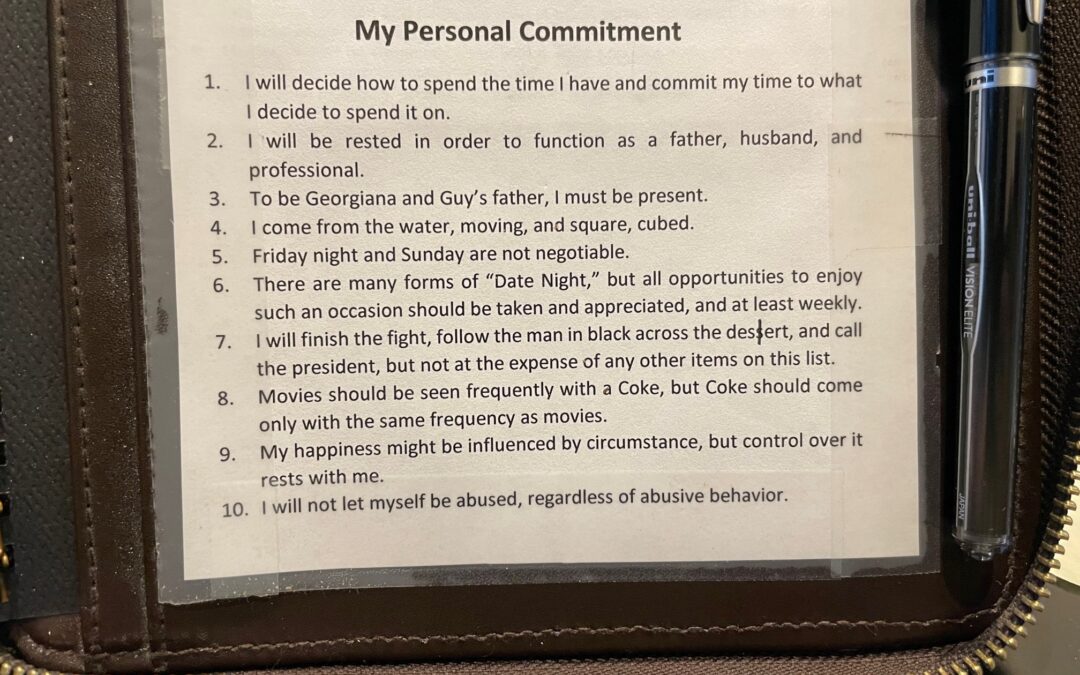I propose ideas to improve the experience of accounting.
Burnout is an occupational phenomenon the World Health Organization characterizes as “feelings of energy depletion or exhaustion”. The accounting industry specifically is notorious for harboring burnout as a “helping” profession where accountants sacrifice themselves for clients, peers, and deadlines.
I’ve learned through experience, or maybe preference, that the simplest solution is perhaps the best (Occam’s Razor). If burnout reflects giving too much of oneself to work, respecting more of what really matters to you would seem a straightforward response. It would probably work something like this:
Define what matters.
Create a list of matters in your life that, regardless of season or workload, you will not sacrifice, and the frequency in which you expect to experience them. These can be conservative or aggressive estimates but must honor what matters most to you. The things that define you. If you value family time, define the numbers of dinners you must share together weekly. If riding a skateboard is a staple of your character, specify your targeted hours grinding per week. Workouts, friendships, hobbies, faith, passions…Start with ten and let them evolve with practice.
Respect what matters with a feverous vigor.
Work as you normally would, but with a new understanding. No matter how busy you are, you will not sacrifice what matters for work. They are the new laws that you live and work by. The minimums.
I’ve included my own list above that has evolved over two decades of busy seasons and is still taped inside my binder today. Make your own list and keep it with you. Ask your spouse or children to help you. Share the list with others and ask that they respect them too.
I believe we become different people when we’re busiest. We don’t just shift gears, we switch identities. By respecting what matters, we can retain our identity, add fuel to our tanks, keep a safe distance from work, and improve our results at the office and at home. And this isn’t quiet quitting. It’s creating a relationship between work and life that is sustainable. We sometimes treat the accounting experience like a sprint, giving too much in too short a period. Instead, we can save enough energy for both our personal and professional lives to enjoy the long miles.
If you want to change an experience in accounting, define and defend what matters most, regardless of the season.
Some other thoughts on burnout:
- Like a Partner: Have you ever asked a staff person if they want to become a partner? I imagine you’ll hear a non-descript position, or likely uncertainty. Partners/CFOs don’t just set the tone at the top, they are the crystal ball into a staff’s future. If staff see these leaders respecting more of what doesn’t matter, than does, how might they expect to turn out? Why would they want to become like you? If you want to manage burnout in your firm, and influence succession and retention while you’re at it, be someone your staff want to become.
- The 7 Ps: Proper Preparation and Planning Prevents Piss Poor Performance. Serious intention and consideration for your schedule and behavior is necessary to create space and opportunity for what matters. We spend a good portion of our lives stumbling through events and moments, accidentally or in reaction to circumstances. If we are going to have a chance at addressing burnout, we can’t expect it to happen naturally. Be intentional. Plan your days and weeks as if what matters is all that does.
- Pace Yourself: I once asked a mentor and avid climber how he conserves energy during a hike, and how I might relate his methods to improve the experience of busy season. He slows down on the flats, conserving energy for the hills, while keeping momentum. The real drain on energy comes from pushing to exhaustion, stopping still, and the mental and physical effort required to start again. Manage your pace in busy season at optimal levels (above typical, but below maximum) to allow momentum at work, but with energy left for what matters.
- We’re All Part Time: Take a moment to reflect on that. We are all working a reduced schedule. We leave time for sleep, family, food, and activities. Circumstances and preferences require some to need more time. I’m going to speak now directly to anyone who has spoken or acted negatively towards an individual working a modified schedule: You are the problem. Those part timers are the tortoise to your hare, and there are more people out there willing to work harder than you, that there are with the guts to work less.
- No “Yes, but…”: I was a big fan of encouraging folks to say “Yes, but…” in response to requests for their time, rather than having to give a cold “No”. It was a way to say, “I can’t now, but I will later.” In hindsight, I’ve shifted my perspective. “Yes, but…” is a passive aggressive effort to meet unreasonable expectations set by blackmailing schedulers. Saying “Yes, but…” builds stress, unclear expectations, and promises that probably won’t be kept. Get comfortable, cozy, and relaxed in either a confident yes or no.
HOMEWORK (that you didn’t ask for):
- Create your list! What really matters to you?
- Read Mark Manson’s The Subtle Art of Not Giving a F*ck.
- Question for you: “Who will you share your list with?”
I am a work coach, and accountants are my work.
That’s it for now. Until you hear from me again, and you will, destroy my inbox. Send me your ideas, insights, thoughts, or experiences on how the game of accounting can be changed.
Douglas M. Slaybaugh, The CPA Coach

Recent Comments